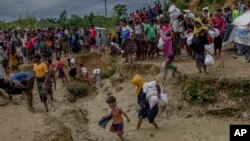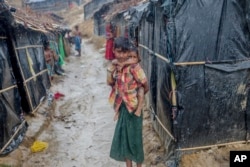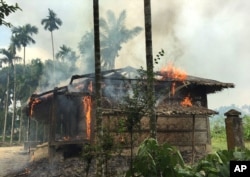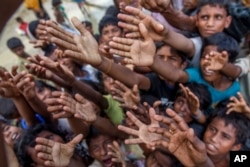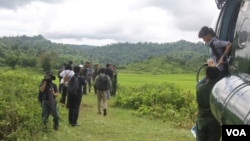Calls are mounting for Myanmar to resume access for aid groups in northern Rakhine state, more than a month after attacks by Rohingya Muslim insurgents prompted an army operation that sent nearly 500,000 people fleeing to Bangladesh.
While most Muslims living in northern Rakhine have fled across the border, an unknown number remain at home and under increasingly isolated conditions, with little access to regular food and health supplies as the lean part of the harvest season approaches.
"The situation in northern Rakhine state is really a humanitarian catastrophe in the making," said Pierre Peron, spokesman in Myanmar for the United Nations Office for the Coordination of Humanitarian Affairs, or OCHA.
United Nations staff and international nongovernmental organizations have had to relocate many of their staff members to other parts of the state and longstanding operations, such as malnutrition assistance and medical services, were dramatically scaled back.
"Since the violence broke out a month ago, all these life-saving important humanitarian activities have been suspended," Peron said. "So we really are calling at the moment for humanitarian access, unfettered access to these areas in order to meet the needs of what were communities that were already very much in need of humanitarian assistance and who are likely to be in even more dire need of life-saving aid."
Jan Egeland, secretary general of the Norwegian Refugee Council, said as part of a joint statement with other relief agencies on Thursday that "it is chilling to imagine the situation of those who might be left behind, unable to flee."
Egeland urged Myanmar's authorities to allow NGOs "full, free and unimpeded access to reach everyone in need everywhere in Rakhine."
Bias toward Rohingya
Aid is a sensitive issue in the western state.
Rakhine Buddhists believe international agencies are biased toward the Rohingya, and the government inflamed these tensions at the beginning of the conflict by publishing photos of World Food Program biscuits that were found in a raid on an insurgent training camp. Aid groups strenuously denied allegations they were somehow supporting the fighters.
Meanwhile, a Rohingya man named Hussein called VOA Burmese in Washington this morning. He said he is from Mi-chaung-zay village north of Maungdaw in northern Rakhine state. He said he was calling from a hideout near his village, and wanted to be anonymous as he is afraid of retaliation.
"I am from Mi-chaung-zay village. Buddhist Rakhines came to raid our village and looted our belongings, including cows. Even though we have informed concerned authorities, they did not take any action. We don't have food supplies anymore and no security for our safety. I would like to you to know that we have no food and [it is] not safe to live here. There were about 50 Buddhist Rakhines with catapults and knives who came to loot our village lately."
Attacks on aid workers
In a joint statement released by the Norwegian Refugee Council and signed by 19 humanitarian agencies, the organization pointed to increased pressure on local aid workers from members of their own communities.
"Threats, allegations, misinformation and public accusations against humanitarian staff have led to genuine fears amongst humanitarian workers, in particular national staff, and have contributed to an environment where targeted attacks on humanitarian staff have taken place," it said.
A local mob in the state capital Sittwe last week attacked a delivery of supplies with stones and Molotov cocktails, according to reports. No one was hurt, but the government arrested and charged nine people.
In its September 22 bulletin, OCHA pointed to parts of Rakhine state where Buddhist landlords and contractors were under pressure not to rent property to or work with aid groups.
Normal deliveries also slowed to other Rohingya camps in the central part of the state in the immediate aftermath of the attack.
The Myanmar government has tasked the Red Cross Movement with delivering aid in northern Rakhine, but groups fear the task is too large for one organization. The Norwegian Refugee Council's joint statement said agencies were "very concerned that this will not be sufficient to meet the enormous humanitarian needs across this region."
Cecilia Goin, a spokeswoman for the International Committee of the Red Cross in Yangon, said it's true that it cannot completely fill the vacuum left by the U.N. and other humanitarian organizations. But it is scaling up its response.
"It's very intense, the needs are huge, and we are trying to provide assistance to as many people as possible," she said.
The violence in northern Rakhine has also displaced tens of thousands of Buddhists into other parts of the state, while other ethnic minorities have been swept up in the fighting.
Earlier this week, the government said it found a mass grave of dozens of Hindus killed by ARSA fighters at the beginning of the conflict. Though relatives have corroborated some of the allegations, ARSA rejected them, saying it doesn't attack civilians.
Khin Soe Win of VOA Burmese contributed to this report.
In Photos: Rakhine State Mass Grave




